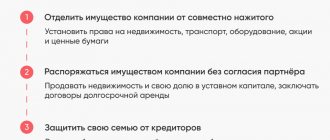Marriage agreement with separate property regime
Marriage agreement with separate property regime No.
g.
"" g.
A citizen of the Russian Federation and a citizen of the Russian Federation, who are married, registered in the year “”, registration number No., marriage certificate No., series, hereinafter referred to as “ Spouses”
", voluntarily, by mutual agreement, in order to regulate mutual property rights and obligations, both in marriage and in the event of its dissolution, we have concluded this marriage contract as follows:
GENERAL PROVISIONS
1.1. This agreement establishes a regime for the separate ownership of spouses both for the spouses’ existing property and for future property. Property that was acquired or will be acquired by spouses during marriage is the property of the spouse in whose name it is issued or registered. In the event of the acquisition of property for which documents are not drawn up or which are not subject to registration, the spouse who contributed funds to pay for this property is recognized as its owner.
1.2. Property that belonged to one or another spouse before marriage, as well as property received by him during marriage as a gift, by inheritance or through other gratuitous transactions, in all cases is the property of the spouse who owned such property, and also was or will be transferred.
1.3. Property belonging to one or another spouse cannot be recognized as their joint property, even if investments were made at the expense of the property or labor of the other spouse that significantly increased the value of this property. Expenses incurred in this case, even in the event of divorce, are not refundable.
1.4. Any income received by one of the spouses, including income for special purposes (amounts of financial assistance, amounts paid in compensation for damage due to loss of ability to work due to injury or other damage to health, etc.), are recognized as the property of the spouse to whom they were paid .
FEATURES OF THE LEGAL REGIME OF CERTAIN TYPES OF PROPERTY
2.1. Bank deposits made by spouses during marriage, as well as interest on them, are, during the marriage and in the event of its dissolution, the property of the spouse in whose name they are made.
2.2. Personal items, jewelry and other luxury items acquired during marriage, regardless of whose funds they were acquired at the expense of, are recognized during the marriage and in the event of its dissolution as the property of the spouse for whom they were acquired and by whom enjoyed it.
ADDITIONAL TERMS
3.1. A spouse who is the owner of residential premises (houses, apartments, etc.) may grant during the marriage, on the basis of an appropriate agreement, the right to use residential premises belonging to him to the other spouse without the right to register there at his place of residence. In the event of divorce, the right to use residential premises provided on the basis of paragraph 1, clause 3.1 of this agreement is terminated. Therefore, the spouse who is not the owner of the relevant residential premises is obliged to vacate it within days from the date of divorce.
3.2. A spouse is not liable for transactions made by the other spouse without his written consent.
3.3. For the obligations of one of the spouses, recovery can only be made on the property of that spouse.
3.4. Spouses are required to notify their creditors of the conclusion, modification or termination of this marriage contract.
3.5. The liability of spouses for damage caused by their minor children is determined by the civil legislation of the Russian Federation.
FINAL PROVISIONS
4.1. This agreement comes into force from the moment of its notarization.
4.2. This agreement may be modified or terminated at any time by agreement of the spouses. Unilateral refusal to perform this agreement is not permitted.
4.3. This agreement terminates from the moment of termination of the marriage, with the exception of those obligations that are provided for in the marriage contract for the period after the termination of the marriage.
4.4. Disputes and disagreements between the parties are resolved through negotiations. If the parties do not come to an agreement, disputes are resolved in court in accordance with the current legislation of the Russian Federation.
4.7. The costs associated with certification of this agreement are paid by.
4.6. This agreement is drawn up in 3 copies, one for each of the parties, and one is kept by a notary.
ADDRESSES AND DETAILS OF THE PARTIES
Spouse
- Registration address:
- Mailing address:
- Phone fax:
- Passport series, number:
- Issued by:
- When issued:
- Signature:
Spouse
- Registration address:
- Mailing address:
- Phone fax:
- Passport series, number:
- Issued by:
- When issued:
- Signature:
Marriage agreement with a general joint ownership regime, with the exception of a specific type of property
Marriage agreement with a general joint property regime, with the exception of a separate type of property No.
g.
"" g.
A citizen of the Russian Federation and a citizen of the Russian Federation, who are married, registered in the year “”, registration number No., marriage certificate No., series, hereinafter referred to as “ Spouses”
", voluntarily, by mutual agreement, in order to regulate mutual property rights and obligations, both in marriage and in the event of its dissolution, we have concluded this marriage contract as follows:
SUBJECT OF THE AGREEMENT
1.1. The spouses agree that all property acquired by them during the marriage (that is, both before the conclusion of this Agreement and after its conclusion) on various grounds provided for by law is recognized as their joint property. This rule applies to any property of the spouses - both movable and immovable. The procedure for owning, using and disposing of this property is regulated by the current legislation of the Russian Federation. An exception to the above rule is the regime of property registered in the name of , which is not the joint property of the spouses under this Agreement, but is recognized as the personal property of the respective spouse. This provision applies to both property already acquired and property that may be acquired in the future. Money that was used or will be used to acquire the property specified in paragraph two of this paragraph is also recognized as property.
1.2. Income received by each spouse during the marriage, including income from labor activity, entrepreneurial activity and the results of intellectual activity, as well as received pensions, benefits and other monetary payments are the joint property of the spouses. An exception to the provision specified in paragraph one of this paragraph is income that was or will be directed by the parties under this Agreement to the acquisition of property that will be registered in the name of. Such income is recognized as personal property.
1.3. Property that is in personal ownership at the time of concluding this Agreement, as well as property acquired by this spouse in the future, will be his personal property even if at the expense of the joint property of the parties under this Agreement or the property of the other spouse, as well as for At the expense of the other spouse’s labor, investments will be made that significantly increase the value of this property (major repairs, reconstruction, re-equipment, or other).
1.4. In accordance with the law, personal property is property that belonged to him before marriage, as well as property received by him during marriage as a gift, by inheritance or through other gratuitous transactions.
1.5. At the time of conclusion of this Agreement, the citizen(s) own the following property: .
1.6. At any time during the marriage, the spouses, by mutual consent, have the right to change the property regime established by this Agreement.
RIGHTS AND OBLIGATIONS OF SPOUSES
2.1. Each spouse is obliged to respect the rights and legitimate interests of the other spouse established by this Agreement and the law, both during marriage and after its dissolution.
2.2. When exercising the powers of the owner (that is, the rights of ownership, use and disposal) in relation to common property, spouses are guided by current legislation. If one of the spouses takes action to dispose of common property, the second spouse must give his consent to this.
2.3. Each spouse independently exercises the powers of the owner in relation to the property belonging to him. The consent of the other spouse to carry out the above actions, including any transactions with such property, is not required.
2.4. Each spouse is obliged to take proper care of the property belonging to the other spouse, to take all necessary measures to prevent destruction or damage to this property, as well as to eliminate the threat of its destruction or damage, including making the necessary expenses at the expense of their own property or the common property of the spouses. The issue of compensation for expenses incurred in such cases is decided by the spouses themselves in each specific case separately.
2.5. Each spouse has the right to use the property of the other spouse in the absence of objections from the owner of the relevant property.
2.6. If one of the spouses loses their ability to work, as well as the occurrence of other circumstances that make it impossible to receive income on their own, the other spouse is obliged to provide support for the spouse who does not have independent income in an amount no less than that provided by law. The issue of maintaining a disabled spouse can also be settled by an additional agreement between the spouses, which is subject to notarization.
2.7. Each of the spouses is obliged to notify their creditor(s) of the conclusion, amendment or termination of this Agreement.
2.8. In the event of divorce, only property that will be in the joint ownership of the spouses at that time is subject to division.
RESPONSIBILITY OF SPOUSES
3.1. Each of the spouses is responsible for the obligations assumed to creditors within the limits of the property belonging to him. If this property is insufficient, the creditor has no right to foreclose on the property of the other spouse.
3.2. The liability of spouses for damage caused by their minor children is determined in accordance with the civil legislation of the Russian Federation.
ENTRY INTO FORCE, AMENDMENT AND TERMINATION OF THE AGREEMENT
4.1. This Agreement comes into force from the moment of its notarization.
4.2. This Agreement terminates upon the termination of the marriage, with the exception of those obligations provided for in the Agreement for the period after the termination of the marriage.
4.3. This Agreement may be amended or terminated at any time by agreement of the spouses. The agreement to amend or terminate the Agreement is subject to notarization.
4.4. Unilateral refusal to fulfill this Agreement is not permitted.
4.5. If the spouses fail to reach agreement on resolving controversial issues that may arise during the period of validity of this Agreement, they will be resolved in court.
4.6. In all other respects not regulated by this Agreement, the parties will be guided by the current legislation of the Russian Federation.
4.7. The costs associated with certification of this agreement shall be paid equally by the parties.
4.8. This Agreement is concluded in three original copies having equal legal force, two of which are kept by the spouses, and the third is in the files of the notary.
ADDRESSES AND DETAILS OF THE PARTIES
Spouse
- Registration address:
- Mailing address:
- Phone fax:
- Passport series, number:
- Issued by:
- When issued:
- Signature:
Spouse
- Registration address:
- Mailing address:
- Phone fax:
- Passport series, number:
- Issued by:
- When issued:
- Signature:
Art. 33 of the Family Code of the Russian Federation (FC RF) establishes a legal regime for the property of spouses, which can be changed by agreement of the parties (contractual regime). We are talking about modifying common joint property into shared, separate, or vice versa. The methods for such changes are not clearly regulated by current legislation. However, this does not mean that the husband and wife cannot resort to those that are not listed in the RF IC. At the same time, interested parties need to remember the legal consequences of changing the property regime.
Ways to change the property regime of spouses In accordance with Art. 256 of the Civil Code of the Russian Federation (Civil Code of the Russian Federation), Art. 33, 34 of the RF IC states that almost any property acquired by spouses during marriage is jointly acquired, or, in other words, it is subject to legal regime. At the same time, the current legislation of the Russian Federation provides for cases when the parties can change it. Here we are talking about such methods as concluding a marriage contract, an agreement on the division of property, determining shares, etc. Let’s consider them in a little more detail. Marriage contract Art. 33 of the RF IC directly establishes that the legal regime ceases to apply in the case when a marriage contract is concluded between a husband and wife. Art. 40 of the RF IC refers to it as an agreement that defines the property rights and obligations of spouses upon divorce. It should be noted that it can be concluded both by persons entering into marriage and between existing spouses at any period of time until its termination. It is in it that the spouses establish that property can belong to them not only on the basis of joint, but also shared or separate ownership. Moreover, this may apply to all existing property, as well as to its individual parts (including those acquired in the future). In addition to the above, all rights and obligations of the spouses regarding the maintenance of this property and the incurrence of expenses for it are also quite clearly defined in this agreement. At the same time, such conditions may be made dependent on the occurrence of any circumstances or limited in time. The procedure for changing and terminating a marriage contract is regulated by Art. 43 of the RF IC and corresponds to the requirements established by Art. 450 of the Civil Code of the Russian Federation, i.e. this can be done by agreement of the parties or in court (unilateral refusal in this case is unacceptable). At the same time, such an agreement may also be declared invalid.
Agreement on the division of property of spouses Another way to change the legal regime of property of spouses is an agreement on its division (Article 38 of the RF IC). As a rule, such a document is drawn up at the time of divorce, however, its conclusion is possible during the existence of the marriage, it all depends on the will of the spouses. In its content, it also implies a change in the “state” of the property regime from common joint ownership to shared or separate. This document must clearly indicate the name of the property, its value, and to whom it is transferred (if not entirely, then in what share). A distinctive feature in this case is that the agreement can only indicate the property that directly occurs in reality. Consequences of changing the property regime of spouses Regardless of the method in which spouses decide to change the legal regime of property, they need to remember the legal consequences that these actions carry. In particular, here we are talking about the following: - in the event of a divorce, the spouses can no longer claim the division of property in equal shares; - when transferring jointly acquired property to one of the spouses, the second loses the right of ownership to it in the legal sense of the word; - moreover, when it comes to residential premises, the ex-spouse also loses the right to reside in it; -the order of inheritance by the second spouse in this case also changes (since he does not initially possess half of the inherited property.
Prenuptial agreement and joint property in case of divorce
does not deprive spouses of joint property According to the general rule (Article 256 of the Civil Code of the Russian Federation), each spouse has something that he is not obliged to share. For example, property received before marriage or already during marriage, but under the rights of inheritance or gift. However, there are a number of nuances here:
1. At the request of the parties, a regime of joint ownership may be established in relation to the personal property of each spouse;
2. If a spouse contributed a large amount of money (or invested a lot of effort) into the property of the second spouse, then it can be recognized by law as joint property (Article 37 of the RF IC);
3. Any regime can be established both in relation to actual property and in relation to future purchases.
download a marriage contract (sample) on any website or draw it up yourself. When drawing up a document, an important nuance should be taken into account: when choosing a joint ownership regime for all property, the parties also assume each other’s credit/debt obligations. Divorce must be accompanied by notification to the creditor bank if the married couple took out a mortgage loan.
Rights and obligations of the parties under a marriage contract
At any stage of your life together, changes can be made to the drafted marriage contract. This is easy to do without radically changing the agreement itself, the main thing is to notarize the adjustments.
Each party has the right to dispose of personal property at its own discretion. It can be sold, donated, or rented.
In accordance with Art. 44 of the RF IC, each spouse has the right to sue the second spouse in order to invalidate the marriage contract (if the contract in one way or another infringes on the rights of the husband or wife). To avoid disagreements, when drawing up an agreement, it is important to take into account the interests of both spouses.
A marriage contract between spouses (sample) can be filled out using the ProstoDocs constructor. The service has many advantages, the main one being simplicity. Each person can easily draw up a legally competent contract in a matter of minutes. Try it yourself!




